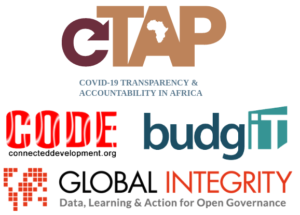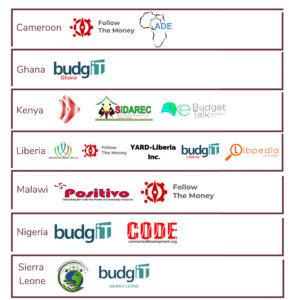African governments response to COVID-19 has been overshadowed by instances of waste, mismanagement, and blatant corruption. Issues like unlawful procurement, political use of monetary and other reliefs, and the diversion of funds have led many communities to deal with the hardship of the pandemic in economic and social isolation. This has further hindered citizens’ trust in government, reproduced social divisions, and increased inequality, leaving countries in a poor position to promote economic recovery. The COVID-19 Transparency and Accountability in Africa Project (CTAP) is a civil society-led effort to bolster citizen engagement and promote change in the ways that governments use public resources, and increase the capacity of governments to meet people’s needs.
What is CTAP?
COVID-19 Transparency and Accountability Project (CTAP) is a collaboration between BudgIT, Connected Development, Global Integrity, as well as partners in 7 African countries: Cameroon, Ghana, Kenya, Liberia, Malawi, Nigeria, and Sierra Leone. We are using a combination of approaches to generate information on how COVID-19 funds are being used by governments and use that information to advocate and collaborate with governments to bring about change. These approaches include:
- Research into the resources that governments are getting to respond to COVID-19, how they have used it, and what actions they are taking to ensure transparency, accountability, and effectiveness.
- This includes a mapping of in-kind and cash donations received by each country from multilaterals, the donor community, and local stakeholders (see here)
- Building local coalitions to fight corruption and waste and promote governance reforms that enable citizen engagement, increase prevention of corruption and waste, and ensure corrective actions as needed.
- Tracking service delivery to raise citizens’ voice and awareness about what they are entitled to and the ways in which their governments are delivering these services.
- Learning and adaptation to improve the implementation of the project across countries, distill lessons and facilitate peer learning that can strengthen the capacity of our partners, and that enables our coalition to identify and pursue clear advocacy and collaboration opportunities moving forward.
What are we learning?
In this five blog series we will share emerging results and reflections from the application of these approaches in seven very different contexts. We have obtained these lessons from continuous monitoring and reflection sessions with partners in each country and peer learning sessions that help our partners share experiences.
Our approach to learning has been guided by 4 learning questions (see table below) that aim to explore the effect that COVID-19 has had on carrying out on the main project activities and delivering on our project in each country.
See the next blog in our learning series.
Learning Questions | Emerging insights |
The country contexts in which our partners are working have called for the diversification of strategies to get and use information to enable citizen mobilization and ensure government action. Emerging insights from this work include: - External incentives have not been enough to change government practices - There are effective alternatives to overcome government opacity, but they come with significant costs - Effective use of data requires engagement and citizen mobilization | |
COVID-19 restrictions, closing civic space, and prioritizing opportunities to promote collaboration and take action have been important challenges that our partners have had to face. This video presents an overview of our 100+ stakeholders network, how partners are dealing with challenges, and our thoughts moving forward . | |
Producing and sharing content in ways that fit every context and enable cross country dialogue is not an easy feat. At the beginning of the project we have focused on human stories, videos of partners’ engagements, and social networks. This approach has delivered initial results in terms of dissemination and promoting action, but we are tweaking in an effort to increase our reach and impact through the diversification of communication tools and tailored support to partners to achieve their communication goals in each country. | |
Partners have acted in technically and politically savvy ways to track service delivery in a way that enables them to identify red flags and specific service delivery problems. In this piece we hear from the voices of our partners about what it takes to use different approaches and what they have found. |
What are our next steps?
CTAP is an ongoing process. As phase 1, ends in October, in the coming months we will continue to work with our partners carrying out additional research on government mechanisms for transparency and accountability, doubling down on local coalition building, and prioritizing with partners advocacy and collaboration opportunities that we can focus on in the second phase of the project to bring about effective change in focus countries.
The COVID-19 emergency is now seen as an opportunity to adopt concrete and sustainable measures, as failures in transparency and accountability that obscure procurement policies for oxygen are no longer an abstract idea for citizens, but the difference between seeing a beloved recovering or dying for lack of access to proper care. This is an opportunity to transform narratives, and to take certain steps to improve how governments deliver services to their citizens.
We also encourage people interested in CTAP to check out the outputs that we have produced so far:
- Research reports about our focus countries, cross country findings, and about the fiscal impact of the pandemic and remaining challenges for vaccine deployment
- Videos with our local engagements and citizen voices
- Infographics and cartoons that enable citizens to understand what’s happening with their money and what they can do
- Webinars about relevant issues about COVID-19 in Africa including equity, anti-corruption, and effective health services and vaccine delivery. This work has been done continuing our #AccountforCOVID virtual space with Public Service Accountability Monitor, Afroleadership, Accountability Lab, and other partners that have joined the conversation.
CTAP is working in seven countries with these local partners:
- In Cameroon with Actions for Development and Empowerment (ADE) and Follow the Money Cameroon
- In Ghana with BudgIT Ghana
- In Kenya with Slums Information Development and Resource Centers (SIDAREC), Ke Budget Talk and Follow the money Kenya
- In Liberia with BudgIT Liberia, Follow the Money Liberia, Libpedia, Volunteer Hub Liberia, and Yard Liberia
- In Malawi with Positivo and Follow the Money Malawi
- In Nigeria with CODE and BudgIT
- In Sierra Leone with BudgIT Sierra Leone and Sierra Leone School Green Club (SLSGC)









